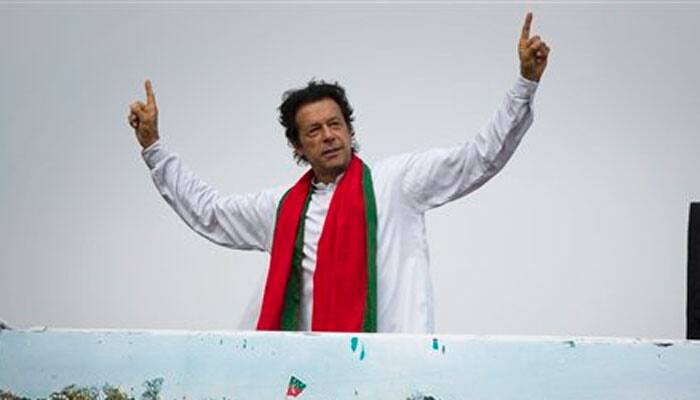Pakistan`s army chief was named mediator Thursday in a fortnight-long political crisis, fuelling speculation that the military could use the protests against Prime Minister Nawaz Sharif to re-assert its dominance over the civilian government.
Thousands of demonstrators led by populist cleric Tahir-ul-Qadri and politician Imran Khan have been camped outside the parliament building in Islamabad since August 15, demanding the prime minister step down.
Qadri and Khan announced General Raheel Sharif would mediate in the stand-off after the cleric earlier on Thursday rejected the government`s decision to launch a murder investigation that named the prime minister as a suspect, saying it was not enough.
"The Pakistan army chief has officially asked us if it will be acceptable to the Azadi (freedom) march if he becomes a mediator and guarantor," Qadri told followers outside parliament Thursday.
"Do I have your consent?" he asked his audience, who loudly replied in the affirmative.
He added the army had asked for "24 hours for mediation".
The protests` other leader, cricket hero turned politician Imran Khan, confirmed the move in a separate speech.
"I want to tell you all that I will not disappoint you. The talks have already started," he added.
The leaders then left their camps to meet with the army chief, according to a military spokesperson on Twitter.
The two-week showdown at the heart of the capital has rattled the nuclear-armed state, and shaken Sharif`s government just 15 months in to a five-year mandate.
As well as wide-ranging calls for political reform, Qadri has demanded police bring murder charges against Sharif over the killing of at least 10 of his followers in clashes with police in the eastern city of Lahore.
Earlier, a statement from the prime minister`s office said that orders had been given to register a murder case against senior government officials including Sharif over the killing of Qadri`s followers in an apparent last-ditch effort to resolve the crisis.
But Qadri rejected the move, complaining the police had not included the same terror charges which were levelled at the cleric and his supporters over the incident against members of the government. Khan and Qadri have alleged massive cheating in the May 2013 poll that saw Sharif sweep to power with a huge majority, though international observers said the vote was largely free and fair.
The two protest movements are not formally allied, but they have gained strength from one another, and Khan`s position would be weakened if Qadri ended his vigil.
In a country that has seen three military coups, the threat of army intervention has cast a shadow over virtually every moment of political crisis.
Sharif met the powerful army chief to discuss the standoff earlier Thursday, the second such meeting in three days.
The two men agreed to "take necessary measures for resumption of stalled process of negotiations for an expeditious resolution in the best national interest", a statement from the PM`s office said.
Analyst Imtiaz Gul said that Sharif was likely to survive the crisis, but would need to make major concessions to the army in exchange for its support.
"It may not necessarily culminate in the resignation of Nawaz Sharif but as of now he seems to have surrendered a lot of political authority. He will emerge as a much weakened Prime Minister," said Gul.
The army is widely viewed as hostile toward Sharif`s efforts to normalise ties with India, and wishes to allow former military ruler Pervez Musharraf, who is facing treason charges, to leave the country.
A military-negotiated end to the crisis would also lend credence to the view, held by many analysts, that the army and its intelligence agencies have been providing material aid to the opposition groups.
The government has set up a judicial commission to investigate poll rigging claims and a parliamentary committee to examine electoral reform, but neither move satisfied the protest leaders.
The protests have so far been peaceful, with security forces -- deployed in huge numbers in the capital -- taking a hands-off approach to the demonstrations.
Neither protest movement has mobilised mass support beyond their core followers, and other opposition parties have shunned Khan`s call to unseat the government and begin a campaign of civil disobedience.
















